Shri Vishnu Puraana/Amsha 6/Introduction
कृष्णाय वासुदेवाय हरये परमात्मने ।
प्रणतक्लेशनाशाय गोविन्दाय नमो नमः ॥
"Salutations and salutations to Shri Krshna, Vaasudeva, Hari, Paramaatma, the destroyer of distress of His bhaktas, Govinda."
(Bhaagavata Puraana, Skandha 10, Adhyaaya 70, Shloka 16)
नारायणं नमस्कृत्य नरं चैव नरोत्तमम् ।
देवीं सरस्वतीं व्यासं ततो ग्रन्थमुदीरयेत् ॥ १ ॥
नारायणं सुरगुरुं जगदेकनाथं भक्तप्रियं सकललोकनमस्कृतं च ।
त्रैगुण्यवर्जितमजं विभुमाद्यमीशं वन्दे भवघ्नममरासुरसिद्धवन्द्यम् ॥ २ ॥
This grantha is to be chanted after offerred salutations to Naaraayana, Nara, and the only Narottama (Bheema), Devi (Maha Lakshmi Devi), Sarasvati (Bhaarati Devi) and Vyaasa Deva. I bow to Shri Naaraayana, the Guru of the Suras (Devas), the One Master of the world, who is dear to His bhaktas, worshipped by all the Lokas, is devoid of the three material gunas (Sattva, Rajas and Tamas), unborn, all pervading, the Primordial Being, Eesha, who removes all defects and is worshipped by the various Devatas and the liberated jeevas.
(Mahaabhaarata, Aadi Parva, Adhyaaya 1, Shlokas 1-2)
अविकाराय शुद्धाय नित्याय परमात्मने ।
सदैकरूपरूपाय विष्णवे सर्वजिष्णवे ॥ १ ॥
नमो हिरण्यगर्भाय हरये शङ्कराय च ।
वासुदेवाय ताराय सर्गस्थित्यन्तकारिणे ॥ २ ॥
एकानेकस्वरूपाय स्थूलसूक्ष्मात्मने नमः ।
अव्यक्तव्यक्तरूपाय विष्णवे मुक्तिहेतवे ॥ ३ ॥
सर्गस्थितिविनाशानां जगतोऽस्य जगन्मयः ।
मूलभूतो नमस्तस्मै विष्णवे परमात्मने ॥ ४ ॥
"Salutations to the Immutable, pure, eternal Paramaatma, always in one form, Shri Vishnu, conquerer of all, Hiranyagarbha, Hari, Shankara, Vaasudeva, the liberator and the cause of creation, preservation and annihilation. Salutations to Shri Vishnu, who is both single and multiple by nature, enormous and tiny, formless and personified, and is the cause of mukti. The cause of the universe’s creation, maintenance and destruction, the root of the universe and who consists of the universe – salutations to Him, Shri Vishnu, Paramaatma."
(Vishnu Puraana, Amsha 1, Adhyaaya 2, Shlokas 1-4)
The Vishnu Puraana is one of the 18 Maha-Puraanas among the Hindu Shaastras. The Shaastras are of two broad categories – 'Shruti' (that which is heard) and 'Smrti' (that which is remembered/known). The Shruti includes the Vedas, namely the texts known as the Samhitas, Aaranyakas, Braahmanas and Upanishads, belonging to different shaakhas (branches) of the four divisions of the Vedas – Rk, Yajus, Saaman and Artharvana. The Smrti includes a diverse category of Shaastras, the prominent ones being the Itihaasas (history), Puraanas (accounts of past events) and Dharma-Shaastras. The Itihaasas are the Raamaayana and Mahaabhaarata. The Maha-Puraanas are 18 in number, with others called Upa-Puraanas. Among them, the best ones which provide clear spiritual knowledge are the Bhaagavata and Vishnu Puraanas, praised even by other Puraanas for the same.
The Puraanas are also categorized based on their inclination of supporting the Supremacy of Vishnu, Shiva or Brahmaa, known respectively as Vaishnava, Shaiva and Braahma Puraanas. An entire Puraana need not be Vaishnava or Shaiva. A Puraana can have sections which are Vaishnava, Shaiva and Braahma in nature. Shri Madhvacharya alone was one of the first philosophers to explicitly state and explain this. The Vishnu Puraana and Bhaagavata Puraana are purely Vaishnava in nature, with their contents completely aligning with the philosophy of Vaishnava Dharma and the Supremacy of Shri Vishnu. Thus, they are of vital importance to obtain philosophical knowledge for Vaishnavas. The Vishnu Puraana is also one of the few Puraanas which have been almost perfectly preserved, evident from commentaries written on them and quotations of bhaashyakaras like Shri Madhvacharya, Shri Ramanujacharya and Shri Paraashara Bhattar, being easily traceable in the present edition. Scholars like Shri Bannanje Govindacharya opine that nonetheless, many portions of the Vishnu Puraana may be missing, as it is reported to have had 23,000 shlokas and the current edition only contains about 7,000. This could be reconciled by the fact that the total number of shlokas is counted by considering every set of 32 letters, or one Anushtup Chhanda, as a single shloka. Certain shlokas in the Vishnu Puraana contain twice or thrice the number of letters in a typical shloka, especially the last ones in the sixth Amsha here. Therefore, not much of the Vishnu Puraana may be lost, though there are missing portions.
The Vishnu Puraana consists of six portions called 'Amshas', each further divided into different chapters called 'Adhyaayas'. The sixth and the last Amsha, containing 8 Adhyaayas, is of utmost importance, as it provides vital knowledge on practising spirituality and bhakti in general, as well as gaining a minuscule understanding of Shri Vishnu, who cannot be completely understood even by immensely powerful beings like Maha Lakshmi Devi, Brahmaa Deva and Mukhya Praana Deva, let alone others! The entire Vishnu Puraana is a conversation between Paraashara Rshi,the father of Vyaasa Deva, and Maitreya Rshi. The former narrates its contents and explains them. This book presents an English translation of the shlokas of the 6th Amsha of the Vishnu Puraana, with their word-by-word meanings and additional explanations.
